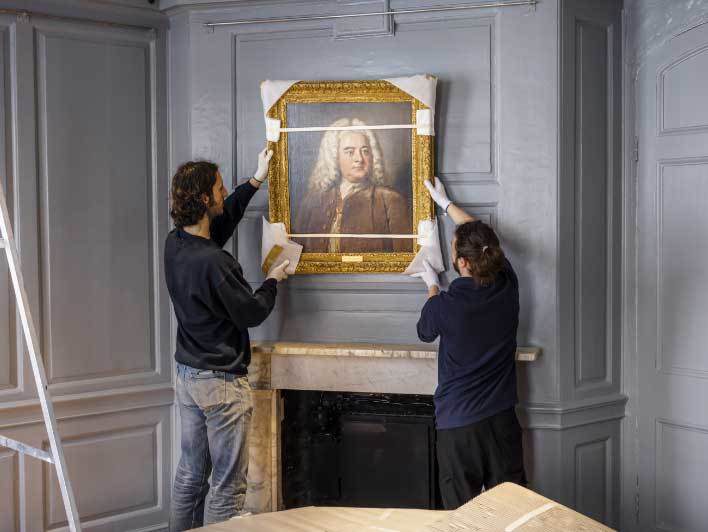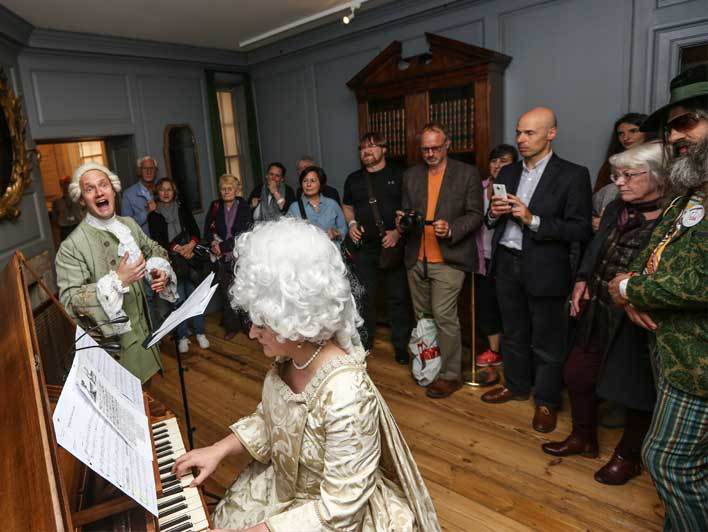FLAVIO, RE DE'LONGOBARDI (HWV 16)
Libretto: Nicola Haym (after Matteo Noris)
First performance: 14th May 1723, King's Theatre, London
Cast
- Gaetano Berenstadt (Alto castrato)
- Francesco Bernardi, called 'Senesino (Alto castrato)
- Francesca Cuzzoni (soprano)
- Margherita Durastanti (soprano)
- Anastasia Robinson (contralto)
- Giuseppe Maria Boschi (bass)
- Alexander Gordon (tenor)

Synopsis
The setting is Lombardy. The land is ruled by King Flavio, who is also the King of England. He has two counsellors, Ugone and Lotario. Ugone’s son, the young knight Guido, is this very day to marry Lotario’s daughter, the noble-minded Emilia. Ugone also has a daughter, the lovely Teodata. He desires her to seek a position as a lady-in-waiting at the court in order “to avoid the bitter solitude of her maiden years”. Little does he know that she already has a secret lover. This is Vitige, the King’s adjutant.
Act I
Before the light of day betrays his presence, Vitige steals from Teodata’s chamber and the lovers take farewell.
Guido’s marriage to Emilia takes place in the house of the bride’s father attended only by close relatives. The bride and bridegroom sing of their bliss then separate until the wedding celebration in the evening.
Ugone presents his daughter to the King and says that she wishes to enter his service. Flavio is more than willing: he is smitten by Teodata’s beauty and promptly assigns her to his wife, Ernelinda.
Lotario invites the King to the wedding feast. At this point Flavio receives a letter from the Governor of England, Narsette, who, enfeebled by age, requests to be relieved of his post. Flavio’s first reaction is to appoint Lotario who is still in his prime. Lotario already begins to luxuriate in anticipation of the honourable appointment. But then Flavio appoints Ugone instead, hoping in this way to rid himself of the father of his new passion and so be able to woo Teodata without interference. Lotario only knows that he has been passed over; he is seething with rage and dashes away.
Flavio rapturously tells his adjutant of Teodata’s beauty. To conceal his own relationship with her, Vitige stutters that “she does not please his eye”, but Flavio continues his eulogy.
Ugone stumbles towards his son: his cheek is aflame from a blow: Lotario has slapped his jealous colleague! The kinght’s code of honour requires him to avenge the insult, but Ugone is too old to weild a sword. He asks his son to fight the duel in his stead, thereby casting Guido into a tragic conflict between his duty to his father and his love for Emilia to whom he has just become betrothed. He proclaims his decision to defend the honour of his own family.
Emilia arrives. She does not understand why he tries to fly from her and vows eternal constancy to him, come what may.

Act II
Flavio is courting Teodata. Ugone rushes in, too distressed to speak coherently. Flavio leaves him to his daughter. Ugone now raves about the loss of the family honour. Teodata thinks that her liaison with Vitige has been discovered and tearfully confesses. Ugone sees himself as being persecuted by fate. Now his daughter, too, has been dishonoured.
Emilia’s father no longer wishes to lose his daughter to the son of his hated rival and bluntly tells her that her marriage is null and void. Guido, in search of his adversary, requests Emilia to leave him alone for a while. She is willing, but…then what? Guido wishes to shatter the bonds of love.
The love-sick King orders his adjutant to bring his beloved to him. Vitige confesses his unhappy mission to her, and she tells him that her father has found out about her secret betrothal. What is to be done? The couple decide to hold the King off for a while – Vitige should pretend to solicit her love for him, and Teodata to feign willingness.
Guido challenges Lotario to a duel. The experienced warrior scoffs at the young man’s foolhardiness, but he falls. Emilia finds him in a pool of blood; he names Guido as his murderer and dies. In despair, she swears vengeance.

Act III
Emilia and Ugone importune the King for justice. She demands the death penalty for her father’s murderer, while he pleads for his son’s life. Overwhelmed by the events, Flavio asks for time to reflect and sends them away. Now Vitige enters with Teodata. The sight of her strikes Flavio speechless and he therefore entrusts Vitige with his suit which, understandably, turns out to be a somewhat half-hearted business. Flavio thereupon undertakes it himself. He calls Teodata “my queen” and promptly tries to conduct her into his bedchamber, while Vitige’s heart becomes “a raging sea” of jealousy.
Emilia is in mourning – for her father and for her fugitive Guido, but then she once again vows implacable vengeance. Guido appears and hands his sword to her that she might kill him. Emilia takes it – lets it fall and leaves. Guido begs the god of love for help.
Vitige and Teodata quarrel: they jealously accuse one another of having gone too far in the hoodwinking of the King and having allowed the game to become serious. Too late they discover that Flavio has entered and overheard everything. Contritely they admit to being lovers. Flavio is crushed.
Guido enters. He begs the King to have him put to death if Emilia still hates him for his deed. Now Ugone confesses that he had incited his son to commit it in his place. Flavio now realises that the wisdom of Solomon will be required to pronounce judgement. He takes courage form the awareness of his kingly responsibilities and sends for Emilia. He tells Guido to conceal himself and listen to the proceedings. Then he tells Emilia that Guido has been executed as she had requested, and that she may see his head right there. She refuses, falls to her knees and begs to be killed, too, since without Guido her life is meaningless. Guido rushes from his hiding-place and she almost swoons with joy. In their concluding duet he begs for forgiveness and she asks for a period of mourning.
Now Flavio’s “punishments” are announed: Vitige, who deceived the King, must marry the girl who does not “please his eye”; Ugone, who ordered the duel, will be banished to England – as Governor – and must acknowledge his son-in-law. Reconciled, they all thank the King in a final joyful chorus.
(c) harmonia mundi UK
Context
Flavio is one of Handel’s shortest operas, as was recognised in the adverts for the first performance in 1723: “At the King’s Theatre…this present Tuesday…will be performed a New Opera call’d, FLAVIUS…By reason of the shortness of the Opera, to begin exactly at Eight a-Clock.'” However, many believe it is a small masterpiece, as it balances the comic and tragic elements of the plot so skillfully. Unusually for a Handel opera, or indeed for eighteenth-century opera generally, it has well developed roles for all four voice ranges. The final performance on 15th June closed the fourth season of the Royal Academy of Music.
Handel had intended to take his company to Paris in July, as had been reported in April in the Parisian newspaper “Le Mercure”:
Several Italian members of the London Opera are due to come to Paris and give twelve performances during the month of July next, for which they will receive a considerable proportion of the receipts.
But the planned visit did not take place, although librettos for both Ottone and Giulio Cesare were published in Paris with Italian texts and stage directions in French.
During the Summer, when the King’s Theatre was closed, the manager set about a thorough redecoration in time for the new season. The “British Journal” of 21st September 1723 announced:
The House in which the Opera’s, &c. are kept in the Hay-Market, is beautifying and new painting by some of the best Masters; Mr. Heidiger the master having ordered 1000l. to be expended on that Account, for the better Entertainment of his Audiences in the Winter.


